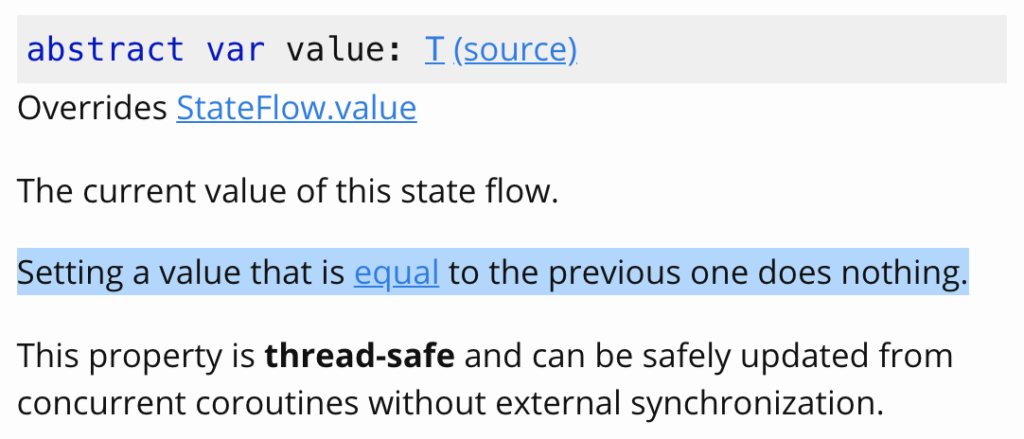I am in love with MutableStateFlow which is part of the Kotlin Coroutines Library. It makes managing state, and exposing it as a reactive Flow so easy.
You just create a MutableStateFlow(initialValue), and then you can later on just set myMutableStateFlow.value = newValue, and if it has changed, it’ll emit a new event as a reactive event on the Flow!
This is amazing, but in order to make this work the way you want it to, you HAVE to use Immutable Data Structures.
Why? Glad you asked, here we go.
How MutableStateFlow’s “value” Property Works
Just set mutableStateFlow.value=newValue and the value will be emitted! This Flow is a great way to keep track of state where you only want to emit when there is a change.

You can set your mutableStateFlow.value many times, but unless !oldValue.equals(newValue), then a new value won’t be emitted. That way subscribers don’t need to use distinctUntilChanged() to filter out duplicates.
Scenario where “My MutableStateFlow Didn’t Emit!“
I’ve simplified a scenario I ran into to share how MutableStateFlow may not work the way you think you should. I banged my head on the wall trying to figure out what was happening, and hopefully this simplified example will save you a headache.
/** Class with Mutable Data */
data class SomePojo(var name: String = "placeholder")val somePojo = SomePojo()
val mutableStateFlow = MutableStateFlow(somePojo)
println("INITIAL: ${mutableStateFlow.value}")
// Update the value
somePojo.name = "Something Different"
// Print MutableStateFlow current value, but realize the value has changed because the data in that object has been mutated
println("CURRENT: ${mutableStateFlow.value}")
// Try to assign the new value to the MutableStateFlow, but they are already equal! This means no emissions will occur.
mutableStateFlow.value = somePojo
// The result is the same, and no value was emitted.
println("UPDATED: ${mutableStateFlow.value}")The output will be:
INITIAL: SomePojo(name=placeholder)
CURRENT: SomePojo(name=Something Different)
UPDATED: SomePojo(name=Something Different)How I Went Wrong
- My state model was “SomePojo” which had a mutable var “name” on it.
- The “somePojo” variable was initially set as mutableStateFlow.value
- I set myPojo.name=”Something Different” to change the name.
- I wanted to emit the new state, so set mutableStateFlow.value=somePojo.
- My MutableStateFlow Didn’t Emit!
- 🤔
- The current value of mutableStateFlow.value was already set to myPojo, and I had modified the property “name” on it.
- As seen above, MutableStateFlow.value will emit unless the oldValue.equals(newValue). Because I had modified the mutable property name, when the equals() comparison happened.
- The value was already the same, and therefore no change occurred, and there was no emission.
- Whoa… that’s confusing. Yes, but it makes sense now.
Conclusion
There are things you can do to avoid running into this problem. Use immutable data structures (classes with all val properties) with MutableStateFlow to avoid unexpected behavior.
If you mutate (change) the value of an object that’s currently the state of a mutable state flow, it won’t emit a new value when re-assigned because it only emits when the value has changed. In this case the mutable value has changed… but so has the underlying state, so when compared it looks as if nothing has changed.
Try for yourself with this Unit Test Gist: https://gist.github.com/handstandsam/1007031cea66e9862bed44840fafb92e